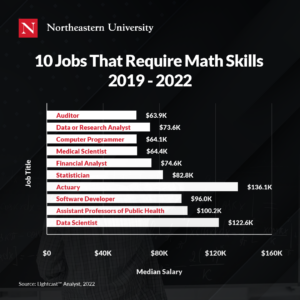Mathematics is applicable to nearly every industry today, from science and technology to business, retail, healthcare, and more. Professionals with advanced degrees in math are highly desirable for their mastery of key skills—particularly for their critical thinking and problem-solving expertise, says Thomas Goulding, lead faculty member for Northeastern University’s programs in artificial intelligence and analytics.
“You won’t see too many job postings for theoretical mathematicians, but where the field of study becomes especially valuable is in a graduate’s ability to apply mathematical concepts to solve any problem they put their mind to,” Goulding says. “Mathematicians have strongly developed logical skills and decomposition skills, they’re very organized, and they can more easily attack big-picture problems.” According to government data, some of the most in-demand mathematical skills listed in job postings include:
- Mathematics
- Advanced Mathematics
- Research
- Planning
- Problem Solving
- Written Communication
- Statistics
- Leadership
- Computer Science
- Teaching

Math majors diverge into two distinct career paths: While some may work in academia as math researchers, others work in diverse industry roles. The industry path is far more common than academic research, Goulding says.
Industry roles vary greatly and the opportunities are endless based on your interests. People with an advanced degree in mathematics and an interest in technology may work as computer programmers, software developers, or data scientists, for example. Others with business interests may take jobs working as auditors or financial analysts, or work as medical scientists if they’re pursuing a career in the healthcare industry.
“You have to transfer your math skills into something that’s interesting and useful to you,” Goulding says. “Ask yourself where your interests lie and how a variety of industries could use technical people like yourself.”
Here’s a sample of 10 careers for people who love math.
Download Our Free Guide to Breaking Into Analytics
A guide to what you need to know, from the industry’s most popular positions to today’s sought-after data skills.
The Top 10 Jobs That Use Math
1. Auditor: $63,900
Auditors examine and prepare financial records while checking for their accuracy, then explaining their findings to key stakeholders. Internal auditors check for mismanagement of an organization’s funds and identify ways to improve processes for eliminating waste and fraud. External auditors are employed by an outside organization to perform the same tasks, while information technology auditors review controls for their organizations’ computer systems.
2. Data or Research Analyst: $73,600
Data analysts use advanced mathematical and analytical methods to help businesses investigate complex issues, identify and address inefficiencies, and make strategic, data-driven business decisions. They frequently use statistical tools to interpret data sets and prepare reports for executive leadership that effectively communicate business trends, patterns, and predictions.
3. Computer Programmer: $64,100
Computer programmers write and test code computer application and software program code. These professionals update and expand existing programs, check programs for errors and fix faulty lines of code. Computer programmers are well-versed in a variety of computer languages, including C++ and Java, and jobs require a background in a variety of math topics.
4. Medical Scientist: $64,400
Medical scientists form hypotheses and develop experiments, often using clinical trials and other investigative methods to research their findings. A medical scientist who performs cancer research may experiment with a combination of drugs that could slow a cancer’s progress, for example. Medical scientists must have a strong background in life sciences, physical sciences, and math.
5. Financial Analyst: $74,600
Financial analysts evaluate investment opportunities in banks, pension funds, mutual funds, securities firms, insurance companies, and other financial services. They’re responsible for evaluating current and historical financial data, studying economic and business trends, and meeting with company officials to gain better insight into the company’s prospects. There are several types of financial analysts, including portfolio managers, fund managers, ratings analysts, and risk analysts.

6. Statistician: $82,800
Statisticians work in a variety of fields—including business, engineering, and the sciences—and apply and develop new mathematical theories and techniques to solve problems. These professionals design surveys, experiments, and opinion polls to collect data, then interpret the data and report conclusions. Statisticians may work alongside chemists, material scientists, or chemical engineers to analyze the effectiveness of new drugs, for example.
7. Actuary: $136,100
Actuaries analyze the financial costs of risk and uncertainty using math, statistics, and financial theory. They also help businesses and clients develop policies to minimize the cost of those risks. Actuaries are essential to the insurance industry and must be experts in advanced statistics and modeling software, mathematics, and business.
8. Economist: $96,000
Economists study the production and distribution of goods, resources, and services by collecting and analyzing data, researching trends, and evaluating economic issues. These professionals study a variety of fields, including health, development, education, and the environment, while others study employment levels, exchange rates, or business cycles.
9. Software Developer: $100,200
Software developers are responsible for the development process of a software program. They analyze users’ needs, then design, test, and develop software that meets those needs. There are a variety of software developers, including application software developers, who design computer applications, and systems software developers, who create the systems that keep computers working. According to government data, some of the most common types of software development positions include:
- Software Engineers
- Java Developers
- Software Developers
- DevOps Engineers
- .NET Developers
- Full Stack Developers
- Full Stack Software Engineers
- Principal Software Engineers
- Salesforce Developers
- Software Development Engineers

10. Data Scientist: $122,600
Data scientists design and build new data set processes for modeling, data mining, and production. In addition to performing and interpreting data studies and product experiments with various data sources, these professionals are tasked with developing prototypes, algorithms, predictive models, and custom analysis.

Is Mathematics a Good Career?
It is clear to see that careers in mathematics are accompanied by a wide variety of career opportunities and benefits. Individuals with these important problem-solving skills can become in-demand applicants in this field, while doing something they love. These common math careers are particularly promising due to their salaries and growth outlooks, which provide professionals with adequate mathematical skills to thrive in the industry through whichever sector they’d like to explore.
For those who love working with numbers, career options extend far beyond theoretical mathematics. Explore Northeastern’s related degree programs, or download our guide to working in analytics below.







Related Articles
Is a Data Analytics Bootcamp Worth It?
What is Learning Analytics & How Can it Be Used?
How to Get Into Analytics: 5 Steps to Transition Careers